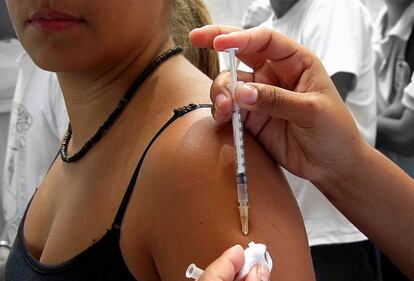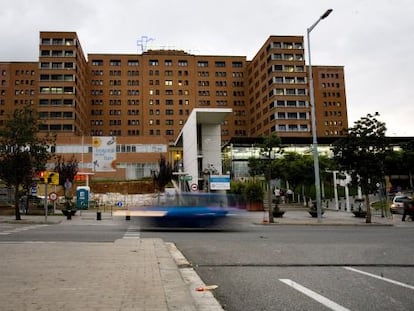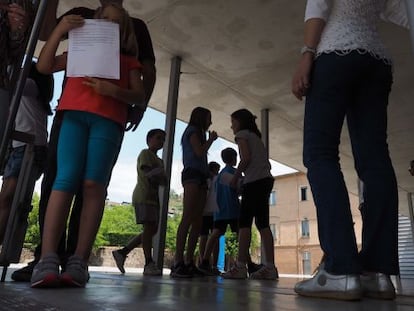Americas formally declared first measles-free region in the world
World Health Organization estimates some 16,000 lives will be saved by end of decade


From Alaska to Tierra del Fuego, from the Atlantic to the Pacific, the Americas is now the world¡¯s first region to be declared free of measles. The announcement was made on Tuesday by the Pan American Health Organization (PAHO), and comes after a 22-year vaccination drive that was delayed by conflict and anti-vaccination campaigners in some countries.
¡°This is a historic day for our region and indeed the world,¡± said Carissa F. Etienne, the director of PAHO, the region¡¯s branch of the UN¡¯s World Health Organization, which is meeting in Washington this week. She added: ¡°It is proof of the remarkable success that can be achieved when countries work together in solidarity toward a common goal. It is the result of a commitment made more than two decades ago, in 1994, when the countries of the Americas pledged to end measles circulation by the turn of the 21st century.¡±
Measles is the fifth vaccine-preventable disease to be eliminated from the Americas
Globally, measles remains a leading cause of death among young children in the developing world. The virus can lead to deadly complications such as diarrhea, dehydration, respiratory infection and encephalitis, and kills an estimated 314 people every day.
Measles is particularly contagious, and primarily affects children. It is transmitted by airborne droplets or via direct contact with secretions from the nose, mouth or throat of infected individuals. Symptoms include high fever, generalized rash all over the body, stuffy nose and reddened eyes. It can cause serious complications including blindness, encephalitis, severe diarrhea, ear infections and pneumonia, particularly in children with nutritional problems and in immunocompromised patients.
About 250,000 people were infected with measles last year, most in Africa and Asia. The last outbreak of measles that originated in the Americas occurred in Venezuela in 2002, PAHO said.
Factors such as conflict made it difficult to access some communities, slowing down the eradication process, explained Merceline Dahl-Regis, chair of a committee of experts responsible for verifying the elimination of measles and other diseases in the Americas.
Danger to children
¡°Measles continues to circulate widely in other parts of the world, meaning we have to be ready to deal with imported cases,¡± warned Etienne, advising governments throughout the region to continue organizing vaccination campaigns and to ¡°immediately report¡± suspected cases.
¡°The Americas region has shown that with immunization campaigns, the right resources and a strong political commitment, it is possible to halt measles,¡± said WHO director general Margaret Chan, adding that the region should ¡°inspire¡± other areas around the world to press ahead with eliminating diseases through vaccines.
In the Americas, 101,800 deaths were attributable to measles between 1971 and 1979. A cost-effectiveness study on measles elimination in Latin America and the Caribbean has estimated that with vaccination, 3.2 million measles cases will have been prevented in the region and 16,000 deaths between 2000 and 2020.
This is a historic day for our region and indeed the world Carissa F. Etienne, PAHO? director?
Measles is the fifth vaccine-preventable disease to be eliminated from the Americas, after the regional eradication of smallpox in 1971, poliomyelitis in 1994, and rubella and congenital rubella syndrome in 2015.
One of the last outbreaks of measles in the region was in the United States in late 2014, which originated at a Disneyland in California and mainly affected children and young people. More than 150 cases were reported in different states, showing the ease with which a disease many thought had been relegated to the past can spread. In July, a woman died from measles-related complications in Washington State.
Despite the scientific evidence that vaccines are not linked to autism, a growing anti-vaccination movement in Europe and the United States has been fueled by parents¡¯ fears that vaccines are not safe for every child.
Earlier this year, during the Republican primaries, Donald Trump weighed in to the debate, highlighting the potential dangers of vaccination, a position he later walked back from.
For her part, Hillary Clinton has supported vaccination campaigns, tweeting in 2015 at the height of the controversy: ¡°The science is clear: The earth is round, the sky is blue, and #vaccineswork. Let¡¯s protect all our kids. #GrandmothersKnowBest.¡±
English version by Nick Lyne.
Tu suscripci¨®n se est¨¢ usando en otro dispositivo
?Quieres a?adir otro usuario a tu suscripci¨®n?
Si contin¨²as leyendo en este dispositivo, no se podr¨¢ leer en el otro.
FlechaTu suscripci¨®n se est¨¢ usando en otro dispositivo y solo puedes acceder a EL PA?S desde un dispositivo a la vez.
Si quieres compartir tu cuenta, cambia tu suscripci¨®n a la modalidad Premium, as¨ª podr¨¢s a?adir otro usuario. Cada uno acceder¨¢ con su propia cuenta de email, lo que os permitir¨¢ personalizar vuestra experiencia en EL PA?S.
?Tienes una suscripci¨®n de empresa? Accede aqu¨ª para contratar m¨¢s cuentas.
En el caso de no saber qui¨¦n est¨¢ usando tu cuenta, te recomendamos cambiar tu contrase?a aqu¨ª.
Si decides continuar compartiendo tu cuenta, este mensaje se mostrar¨¢ en tu dispositivo y en el de la otra persona que est¨¢ usando tu cuenta de forma indefinida, afectando a tu experiencia de lectura. Puedes consultar aqu¨ª los t¨¦rminos y condiciones de la suscripci¨®n digital.










































